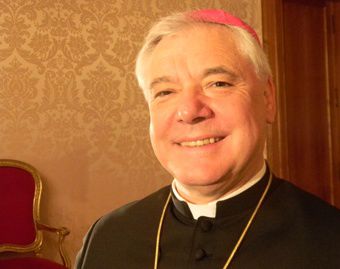Archbishop Gerhard Mueller, who will be made a cardinal Feb. 22, is a personal friend to Benedict XVI and has forged a good relationship with Pope Francis.
The prefect of the Congregation for the Doctrine of the Faith was appointed to his position by Benedict in 2012, and was confirmed in the role by Pope Francis shortly after his election as Bishop of Rome.
Archbishop Mueller is among 19 men who will be given the red hat of a cardinal at the Vatican later this month. He is one of three who join the cardinalate by virtue of their office in the Roman Curia.
The native German was born in 1947, and studied philosophy and theology in his hometown, Mainz, as well as Munich and Freiburg. He received a doctorate in 1977 with a thesis on The Church, the sacraments, and the thought of the Protestant theologian Dietrich Bonhoeffer, having studied under Father Karl Lehmann, who later became Mainz’ bishop.
He was ordained a priest of the Diocese of Mainz in 1978, and served in several parishes while continuing his studies. He became a professor of dogmatic theology at the Ludwig Maximilian University of Munich in 1986.
Archbishop Mueller was consecrated as Bishop of Regensburg in 2002. He chose for his episcopal motto “Dominus Iesus,” a quote from St. Paul’s letter to Romans and also the title of the Congregation for the Doctrine of the Faith’s declaration on the unicity and salvific universality of Christ, which was issued two years prior by the then-prefect, Joseph Ratzinger.
Archbishop Mueller was appointed a member of the congregation in 2002, and so was able to get acquainted with the modus operandi of the Congregation for the Doctrine of the Faith under Ratzinger: characterized by much collegiality and much debate, while the condemnations were few, and combined with documents that also highlight the positive aspects of some theories.
As Bishop of Regensburg, he engaged in the new evangelization, and worked on ecumenical relations with both the Russian Orthodox and Lutherans. He has written more than 400 works on dogmatic theology, ecumenism, revelation, hermeneutics, and holy orders.
When in 2012 Benedict XVI had to replace Cardinal William Levada as prefect of congregation he had once headed, he nominated Archbishop Mueller.
As soon as rumors about the possible appointment broke out, a series of leaks were spread to undermine the people’s trust in Archbishop Mueller.
The leaks contained excerpts of his books, allegedly showing that he does not belief in transubstantiation or the perpetual virginity of Mary, and also displaying his supposedly unorthodox ecumenism and relations with Protestantism. But the excerpts were presented completely void of their context, and thus do not convey the doctrine prefect’s ideas.
Archbishop Mueller was also attacked because of his friendship with Gustavo Gutierrez, one of the fathers of liberation theology.
Benedict has been so pleased with the archbishop’s work that he has charged him with editing his collected works, and in 2008 the archbishop established the Pope Benedict XVI Institute to help publish the works and to study them.
As a personal friend of Benedict XVI, some thought that he would not be confirmed as prefect by Pope Francis. But three days after his election, Pope Francis did confirm Archbishop Mueller as prefect of the Vatican’s office for doctrine.
Archbishop Mueller knows Latin America well, given his frequent trips to Peru and his friendship with Gutierrez.
Since Pope Francis’ election, the prefect’s time has been largely marked by months of back-and-forth between himself and bishops from his native Germany, who have suggested that divorced and remarried Catholics could receive Communion under certain circumstances.
Archbishop Mueller has consistently denied this possibility, while affirming the importance of personal pastoral care for such persons.
Having been a friend of Benedict XVI, Archbishop Mueller has also cultivated a relationship with Pope Francis --- the two had lunch at the prefect’s home Nov. 18, and so the prefect of the Congregation for the Doctrine of the Faith is a bridge between two popes.
Andrea Gagliarducci is Catholic News Agency's Vatican Observer.

